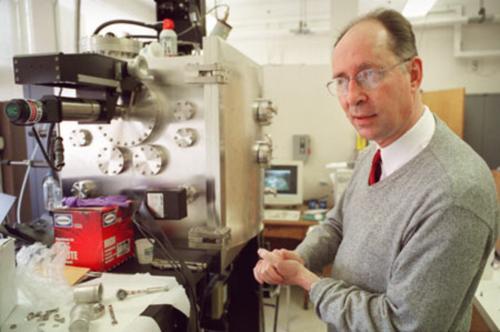
News
HMS Is Facing a Deficit. Under Trump, Some Fear It May Get Worse.

News
Cambridge Police Respond to Three Armed Robberies Over Holiday Weekend

News
What’s Next for Harvard’s Legacy of Slavery Initiative?

News
MassDOT Adds Unpopular Train Layover to Allston I-90 Project in Sudden Reversal

News
Denied Winter Campus Housing, International Students Scramble to Find Alternative Options
Veteran Spaepen To Serve as Interim Dean of Harvard Engineering School
'My feeling is that he is just a perfect candidate for the interim dean—and in fact, maybe for the dean of SEAS,' says colleague

Frans A. Spaepen, an applied physics professor who served as director of Harvard's Rowland Institute, will become interim dean of the University’s School of Engineering and Applied Sciences as of September 15, Dean of the Faculty Michael D. Smith announced last Friday.
Spaepen will succeed Dean Venkatesh “Venky” Narayanamurti, who is stepping down after a decade of service during which time he presided over the transition of what used to be the Division of Engineering and Applied Science into a school last fall, a move that the University has touted as indicating its increased commitment to the applied sciences.
“I am delighted that Frans agreed to be the interim dean,” Venky said, adding that Spaepen, who has been on the faculty for over 30 years, is one of the school’s most respected professors. “I think for a transition he will really make sure things grow strongly. He spans applied physics, material sciences, and other disciplines—he has a broad view of the world.”
Venky first announced his intentions to step down as dean in June 2005 before deciding to stay on another year after both former University President Lawrence H. Summers and former Dean of the Faculty William C. Kirby left their positions.
"I feel that I’ve taken this engineering and applied sciences to a high level in the last 10 years, and it has to be taken to the next level,” Venky told The Crimson this February after announcing that he would leave the deanship to return to the faculty. “That’s a minimum five- to 10-year project. I thought it would be better if a new person comes in.”
After Spaepen assumes the administrative duties this fall, Venky will focus on teaching and research within the SEAS. Additionally, he will be assessing undergraduate education and university management while on a yearlong sabbatical at the Business School.
Spaepen, a materials scientist, is expected to serve as interim dean for at least one semester, as the committee led by University President Drew G. Faust, Provost Steven E. Hyman, and Smith continues its search for a permanent dean, according to a spokesman for the school, Michael P. Rutter.
Spaepen declined to be interviewed for this article, stating that his current travel schedule is too irregular.
Spaepen, whose research spans a wide range of experimental and theoretical topics in materials science, took over as director of the Rowland Institute at Harvard in 2002 when the research laboratory merged with the University. Located on the banks of the Charles near MIT, the institute emphasizes interdisciplinary research in physics, chemistry, and biology.
Michael M. Burns, who is the associate director for science at the Institute, said that the Junior Fellows program has been the major focus of the Institute under Spaepen’s leadership. Established in 2003, the program provides young scientists—usually those who have recently received their PhDs—with the opportunity to undertake independent experimental work for five years with financial backing from the Institute.
“He’s been a wonderful director in that he can advise and suggest without dictating and still bring out the best in researchers,” Burns said, adding that the Junior Fellows program in particular have been a continuation of the ideals that the Institute’s founder Edwin H. Land espoused. “You sort of don’t know he’s directing, but the end result is really good.”
Burns added that once the search committee finds a permanent dean for the SEAS, Spaepen will be returning to the Institute as director.
Spaepen, who received a PhD in applied physics from Harvard in 1975, has played an active role in several interdisciplinary research centers at the University, including the National Science Foundation-funded Materials Research Science and Engineering Center and the Center for Nanoscale Systems.
Fellow SEAS professor Joanna Aizenberg, who was on the interim dean selection committee, praised Spaepen’s qualities as both a scientist and leader.
“It’s probably impossible to find a better person for this position,” Aizenberg said. “My feeling is that he is just a perfect candidate for the interim dean—and in fact, maybe for the dean of SEAS.”
—Staff writer Alissa M. D'Gama can be reached at adgama@fas.harvard.edu.
—Staff writer June Q. Wu can be reached at junewu@fas.harvard.edu.
Want to keep up with breaking news? Subscribe to our email newsletter.
